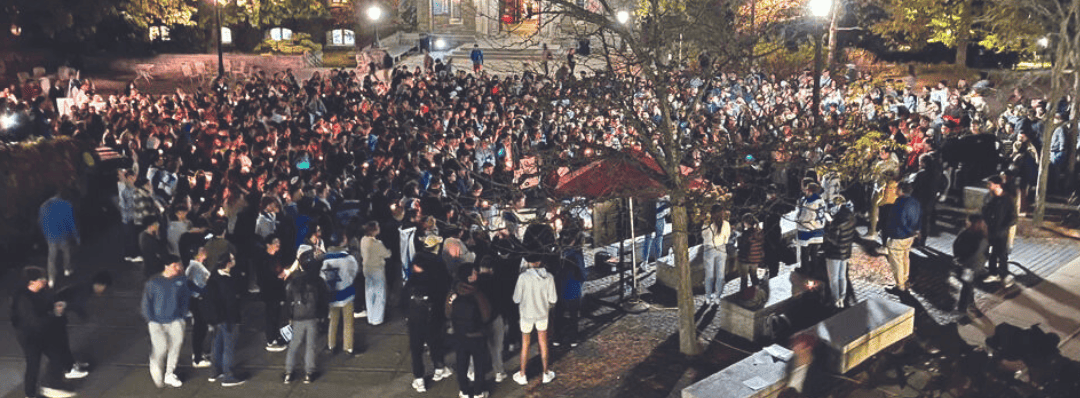Stephanie Peck
Israel’s war with Hamas permeates campus life at colleges and universities across the nation with protests and threats upending daily life.
Jewish News asked several Jewish students from Tidewater about their reactions to their school’s approach to the conflict, the rallies taking place, and the overall feeling of being members of a minority population on campus.
Some students declined to participate; one Tidewater native wrote: “I would really like to participate, but I just don’t feel comfortable right now. A lot of my friends, and their friends, have been targeted by outwardly expressing their Judaism, and though I’m sure I’d be fine, my angst is getting the better of me in this situation.”
Those who did respond were thoughtful and thorough with their replies.
Asher Baum
Drexel University – Junior
John Fry, Drexel’s president, sent a pretty basic letter. Since it’s a huge school, he can’t anger anyone.
I am a very left person, and I attended a peaceful, pro-Palestinian rally. The rally did not call for the death of Jews; it was calling out the occupation of Gaza and the war crimes committed by Israel (cutting off water is against humanitarian rights). It’s a difficult situation to be in, as a progressive Jew in America. The pro-Israel rallies chanted “level Gaza.”
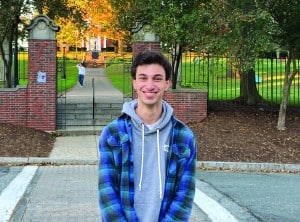 Micah Baum
Micah Baum
Tufts University – Freshman
I have been attending events at Tufts Hillel since orientation week. It has been among my biggest social outlets as well as a place for me to safely practice Judaism. They have been doing their best to provide a safe space on campus since the violence began, providing dinners and other programs for the Jewish community to relax and escape from the stresses of the conflict, as well as some programming related to the conflict.
The first school-wide email regarding the violence emphasized the mourning and sorrow associated with the conflict, and the hope for a respectful discourse around it on campus, with links to resources to aid Tufts students in need of mental healing. The next day, the recently inaugurated university president, Sunil Kumar, sent a personal message condemning Hamas’ actions as “heinous” and “barbarism.” Since then, we have received several emails regarding student responses to the conflict, one reminding students about proper procedure to organize a protest, and multiple emails regarding increased university police patrols to ensure campus safety. There have been no reports of Jewish students being negatively targeted on campus, which makes me know that, while things may be uncomfortable here, they could certainly be worse.
Hillel and Chabad held a joint vigil the Monday after the initial attacks, which I attended, along with about 200 others. The campus chapter of SJP (Students for Justice in Palestine) held one the next day. A Jewish acquaintance said that while walking past the SJP vigil, she wanted to join them and mourn for Gazan lives lost as well as Israelis, but she didn’t know if she would be welcome, so she kept walking. Since then, chalk messages in support of Palestine and against Israel have appeared on sidewalks around campus. Posters have gone up outside dining halls, some naming kidnapped Israelis, some saying “stop the misinformation” and calling attention to Palestinians killed by Israeli forces. The major SJP protest took place last Friday, which I could hear from my classroom. The Tufts Daily reports that more than 120 students attended with three demands of the University: to disclose and divest from all its investments in business with profits from Israel, to release a statement condemning the “genocide” in Gaza, and to halt all university sponsored trips to occupied Palestine.
I have mixed feelings towards this situation. On one hand, aside from statements seemingly supporting Hamas from SJP (applauding the “creativity necessary to take back stolen land”) and the Tufts Revolutionary Marxist Students group (stating support for “the Palestinian mass-led overthrow of the colonial Zionist Israeli apartheid state”), overt antisemitism on Tufts’ campus has been relatively absent. That said, this is the first time I can remember opting against wearing a shirt with the BBYO logo (a menorah) because of fear. I’ve since gotten over that fear, and I see as many, if not more, students than before are proudly wearing symbols of Judaism, from Star of David necklaces to kipot to unambiguously Jewish or Israeli shirts and sweatshirts. Still, there is a definite sense of discomfort mixed in with the pain and grief that are universal in the Jewish community now, a discomfort around our identity as well as a discomfort around understanding where we should stand and whom we should believe regarding the conflict. There have not been many major developments, and tensions seem to be easing, but they do not feel likely to disappear.
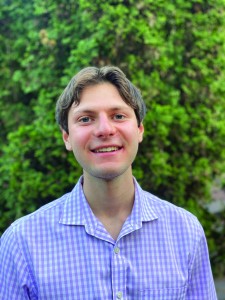 Blake Brown
Blake Brown
Duke – Junior
I was a little disappointed by the university’s response to the situation. The president of Duke sent out a perfunctory email encouraging students to condemn brutality and hatred. The email did not have much substance and essentially asked students to not fight each other and to refrain from antisemitic and anti-Muslim rhetoric.
One pro-Palestinian rally, which was supposed to consist of SJP (Students for Justice in Palestine) from both Duke and UNC, took place at Duke. Preemptively, Duke threatened to bring in police should the protest take place, since non-Duke students were going to be on campus. This deterred them, and only Duke students participated in the peaceful protest.
All of the Jewish organizations on campus came together to hold a vigil, uniting Chabad and Hillel (whose heads normally don’t have the best relationship due to disparate beliefs). Likewise, groups like the Jewish Student Union have been holding more events for students to come together or take solace.
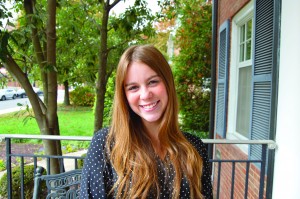 Allison Comess
Allison Comess
University of Maryland – Senior
UMD’s president has sent two emails to the student body. The first email was sent two days after the attacks. The email recognized the impact of war on all members of the community, encouraged the UMD community to work towards a better world, and offered support and resources. A lot of people in the Jewish community, including myself, were frustrated by this email, because it failed to acknowledge that the events taking place were not war and were in fact senseless attacks carried out by a terrorist group. From my perspective, it seemed the school wanted to provide a statement just to say that they said something. However, the second email our president sent a few days later was much better. The second email fully condemned the acts of terrorism from Hamas and also stated that there will be an increased police presence on campus, along with urging faculty to be flexible with students during this difficult time.
There have not been rallies on campus, but there was a vigil for all the Israeli lives taken from the terrorist attacks. I went to the vigil with all of my Jewish friends. More than 1,000 people showed up, and it was great to see the entire Jewish community come together in such a difficult time. Additionally, UMD’s president came and made a statement, showing how much he cares about the Jewish community.
Kacey Cooper
Washington and Lee University – Senior
The school itself has not said anything directly about the conflict, but Hillel welcomed all students to participate in a candlelit vigil. All of the Jewish students on campus were emailed and given resources to help cope with everything that had happened. It included information on how to deal with harassment, professors or students who were hostile, social media posts, and more.
No rallies have taken place on campus on either side of the conflict. If anything, my campus has been a little quiet about the conflict. The day after our vigil, we lined up small Israeli flags on an open field near the classrooms and they are still up. No one has tried to take them down or vandalize them.
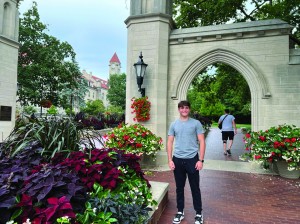 Robert Crum
Robert Crum
Indiana University – Freshman
My school sent a message regarding the war in Israel, and it was underwhelming and superficial – just acknowledging the conflict.
I attended the joint Chabad and Hillel rally on campus, where Palestinians were driving by saying antisemitic and hate speech. As our rally took place, they had a Palestinian rally nearby, where they were chanting “free Palestine” while we were praying for Israel. When our rally was over, we went to get food and passed their rally, where they were saying antisemitic and other things such as “you get what you deserve” and would try to get aggressive; however, the police walled them off.
Matthew Gross
Loyola University New Orleans – Junior
Loyola University does not have a sizable Jewish population. However, due to close ties between Loyola and Tulane, Loyola students are welcome to participate in Tulane Chabad activities.
As of now, Loyola University has not issued any official communication concerning the situation in Israel. In my perspective, addressing the issue would be beneficial, as it would provide students with a better understanding of the importance of avoiding actions or activities that may have unintended consequences.
A notable rally took place on Oct. 26.
The rally was marked by a somber atmosphere, with instances of significant hostility directed at the Jewish community. Regrettably, a pro-Palestinian supporter resorted to physical violence against pro-Israel advocates, a distressing incident that garnered national media attention. I found the turn of events deeply disheartening, as the rally was intended as a peaceful protest.
Leo Kamer
Johns Hopkins University – Junior
The university’s president sent a message on October 10 about the war, referring to the October 7 attack as an act of brutality. He also lamented the deaths of Palestinian civilians. The president included links to the webpages
of the Office of Student Health and Well-Being, and he promised discussions facilitated by Hopkins’ Middle East experts. If there is to be statement from the university, I am pleased that this one recognized the emotional support students may need. Overall, the president’s letter was appropriate.
Some days after the conflict started, around 100 Jewish students, as well as Hillel and Chabad rabbis, gathered on one of our quads to sing and pray. I briefly participated in this gathering, and it was a beautiful display of solidarity.
The next week, there was a vigil for the Palestinian dead on another quad; the week after that, there was a protest, a march around campus, that called for a ceasefire and generally represented the anti-Israel or pro-Palestine position. I was not present at either of these events.
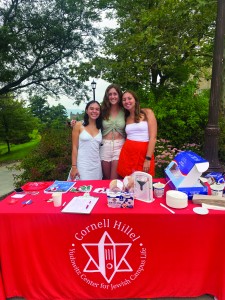 Yael Schranz
Yael Schranz
Cornell University – Sophomore
We were on fall break when the devastations of October 7 occurred.
Our president, Martha Pollack, who is Jewish, sent a disappointing email.
She wrote expressing her deep sadness about the attacks in the Middle East but did not condemn Hamas’ acts of terrorism and did not mention the state of Israel at all. She also compared the attacks to other events in the world such as the atrocities in the Nagorno-Karabakh region and the earthquake in Afghanistan. Although the loss of any human life is tragic, the Cornell president should be focusing on addressing students’ mental health after the October 7 attacks, not comparing them to other world tragedies, making the acts of terrorism as normal as other horrific events. But they are not. The day was beyond horrific; it was inhumane. And it cannot be compared to any other day in history.
The following day, President Pollack sent a follow-up email to address the outrage resulting from the first email, where she condemned Hamas’ attack as acts of terrorism and refers to the attacks occurring in Israel, not the Middle East. There have been many more emails since then relating to the attacks of October 7, as many Jewish donors pulled out from giving to Cornell. A Cornell history professor called the attacks “exhilarating and exciting,” anti-Israel messages were sprayed-painted around campus, and antisemitic threats to our kosher dining hall and Jewish living center were made by a Cornell student. With every week, there is a new wave of antisemitic and anti-Zionist attacks occurring on campus. Our community is still healing from what is occurring in Israel, and simultaneously we must fight for our rights and beliefs as Jews and Zionists.
Cornell improved significantly in making the Jewish community feel safe. After the antisemitic threats, the Governor of New York and President Pollack came to the Center for Jewish Living to discuss the matter and see how they can best support students. Even more faculty attended Shabbat dinner that week to show that the Jewish community at Cornell is strong, and it is not going anywhere.
To honor the lives lost in the attacks and pray for the hostages return, we had a Support for Israel vigil. We shared personal stories, sang songs, and came together to support each other. After the vandalism of anti-Israel hate across campus, we had another community gathering to show that the hate that exists on campus is unacceptable, yet we are not scared of it and we will continue to speak up about the truths occurring in Israel. I helped plan both of these gatherings to make sure they fit with what the community needed. We continue to have educational speakers and events updating students about what is going on in Israel. Hillel and Chabad have created more open spaces for people to convene and talk about their feelings. We are proud supporters of Israel, and we will show that pride by visibly being Jewish – such as wearing kippas and Star of David necklaces.
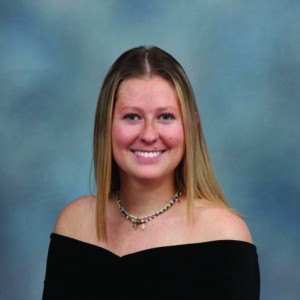 Rachael Stromberg
Rachael Stromberg
James Madison University – Senior
JMU released a statement regarding the conflict in Israel, basically saying they condemn the violent actions taken by Hamas towards Israel. The announcement remained relatively broad, but it also brought a sense of comfort to know that affected students are being acknowledged by JMU faculty. They also offer support by listing resources like the JMU Counseling Center.
JMU Hillel, Chabad, and AEPi (fraternity) hosted a vigil on the quad to honor the lives lost in Israel. The event was well attended and successful in bringing members of the Jewish community together. There was also security in place for extra safety, due to the nature of the event and controversy of the situation.
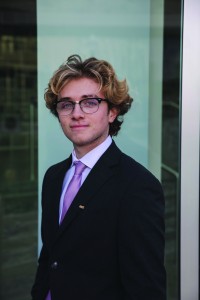 Danial Watts
Danial Watts
Virginia Tech – Junior
Hillel at Virginia Tech has been in constant communication with us, offering support, counseling, and opening their doors late in the night. Through Hillel, we have participated in a solidarity walk and vigil, standing with hundreds of other Jews at Virginia Tech. Even at the football game on October 14, a moment of silence was held in support of Israel and the total quiet was extremely moving.

